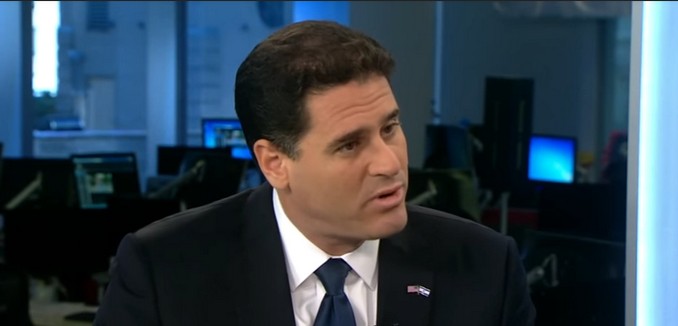In a sign of warming ties between Israel and Arab states, the ambassador of the United Arab Emirates to the United States shared a table with his Israeli counterpart at a public pro-Israel event in Washington, D.C., on Wednesday evening. The two officials sat next to each other at the annual dinner of the Jewish Institute for National Security Affairs in Washington, The Times of Israel reported.
Israel’s ambassador to the U.S., Ron Dermer, was spotted with Emirates envoy Yousef al-Otaiba. The pair were seen talking closely as they listened to a speech by U.S. Secretary of State Mike Pompeo. The Egyptian ambassador to the U.S., Yasser Reda, was also seated at the table.
The Times reported that the fact the envoys sat together publicly at an event covered by dozens of journalists, shows that the two countries are increasingly prepared to acknowledge the growing relationship between them.
Wednesday was not the first time Al-Otaiba had been seen together with senior Israeli officials. Earlier this year, the envoy was dining in Washington with Bahrain’s ambassador, Sheikh Abdullah bin Rashed bin Abdullah Al Khalifa, as well as Brian Hook from the U.S. State Department and a group of journalists.
Al-Otaiba reportedly heard that Israeli Prime Minister Benjamin Netanyahu and his wife Sara were having dinner in the same restaurant and invited them over to his table. According to reports, there were smiles and a few jokes, when the Netanyahus talked to the group. They also discussed Iran and other issues and, when they left, shook hands with the two Gulf ambassadors.
Dan Shapiro, a former U.S. ambassador to Israel, said of Netanyahu’s meeting that it was “important in beginning a process of preparing Arab publics to share the Arab leadership’s view that Israel is a strategic partner.”
Netanyahu, in his address to the UN General Assembly in September, praised the “intimacy and friendship that I have not seen in my lifetime” with Arab States. “Israel deeply values these new friendships, and I hope the day will soon arrive when Israel will extend a formal peace, beyond Egypt and Jordan, to other Arab nations, including the Palestinians,” he added.
Like other Arab states, the UAE does not formally recognize Israel and maintains no official diplomatic ties with the Jewish state. However, over the past few years, evidence of strengthening ties and normalization of relations between the two countries have occurred.
In September, it emerged that the Gulf state had agreed to allow the Israeli national anthem to be played and the Israeli flag to be flown in an upcoming judo tournament in the sheikhdom on October 25 through 27. The UAE also invited Israel’s Culture and Sports Minister, Miri Regev, to the event despite the fact that Israeli passport holders are usually not permitted to travel to the emirate.
In July, a delegation from the UAE reportedly visited Israel to learn more about the operations of the F-35 fighter. In April, an Israeli team competed in an off-road race in the UAE.
In November 2015, Israel established a diplomatic mission in Abu Dhabi, the capital of the UAE, as part of the International Renewable Energy Agency (IRENA).
Driving the shift is the growing alignment of vital security interests between Israel and Sunni Arab states, above all the hegemonic ambitions of the Islamic Republic of Iran that are destabilizing the region from Lebanon, Syria, and Iraq all the way to Yemen.
Most of the Sunni Arab states, including Saudi Arabia and the UAE, share a view that Iran presents the greatest threat to the region and that Israel, with its strong military, thriving economy and prosperous tech sector, has become an attractive regional partner.




